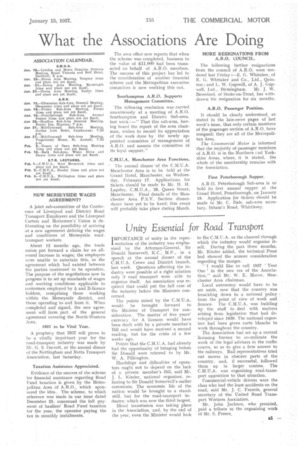Unity Essential for Road Transport
Page 35

If you've noticed an error in this article please click here to report it so we can fix it.
IMPORTANCE of unity in the repre sentation of the industry was emphasized by the Attorney-General, Sir Donald Somervell, KC., MY, in a speech at the annual dinner of the C.M.U.A. Crewe and District branch, last week. Questions affecting the industry were possible of a right solution only if road transport were able to organize itself. An association was required that could put the full case of the industry before the Ministers concerned.
The points raised by the C.M.U.A. would be brought forward tothe Minister of Transport for consideration, The matter of five years' currency for A licences would have been dealt with by a private member's Bill and would have received a second reading, but for the crisis of a few weeks ago.
Points that the C.M.U.A. had already had the opportunity of bringing before Sir Donald were referred to by Mr. W. A. Pilkington, Hardships and difficulties of operators ought not to depend on the luck of a private member's Bill, said Mr. J. L. Kinder, national organizer, referring to Sir Donald Somervell's earlier comments. The : economic life of the nation would be brought to a standstill, but for the road-transport industry, which was now the third largest.
Blood transfusion was taking place in the Association, and, by the end of the year, even the Minister would look to the C.M.U.A. as the channel through which the industry would organize itself. During the past three months, Mr. Kinder added, the technical Press had showed the utmost consideration regarding the merger.
" I would like to call 1937 Year One ' in the new era of the Association," said Mr. W. E. Macve, Manchester Area chairman.
Local autonomy would have to be set aside, now that the country was knuckling down to a national policy from the point of view of work and finance. The C.M.U.A. was building up the staff to deal with matters arising from legislation that had developed since 1930. The national organizer had been given carte blanche to work throughout the country.
The Association had set up a central licensing bureau to co-ordinate the work of .the legal advisers in the traffic courts, so as to give a firm answer to the railways. Rail representatives tried out moves in obscure parts of the country, and, if successful, followed them up in larger centres. The C.M.U.A. was organizing road-transport opposition to that situation.
Commercial-vehicle drivers were the class who had the least accidents on the road, said Mr. J. C. Francis, general secretary of the United Road Transport Workers Asociation.
Mr. John Jackson, who presided, paid a tribute to the organizing work of Mr. S. Preece.




















































































